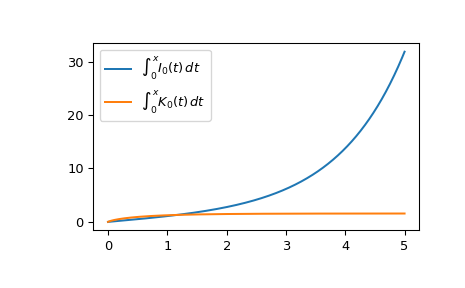scipy.special.iti0k0#
- scipy.special.iti0k0(x, out=None) = <ufunc 'iti0k0'>#
Integrals of modified Bessel functions of order 0.
Computes the integrals
\[\begin{split}\int_0^x I_0(t) dt \\ \int_0^x K_0(t) dt.\end{split}\]For more on \(I_0\) and \(K_0\) see
i0andk0.- Parameters:
- xarray_like
Values at which to evaluate the integrals.
- outtuple of ndarrays, optional
Optional output arrays for the function results.
- Returns:
References
[1]S. Zhang and J.M. Jin, “Computation of Special Functions”, Wiley 1996
Examples
Evaluate the functions at one point.
>>> from scipy.special import iti0k0 >>> int_i, int_k = iti0k0(1.) >>> int_i, int_k (1.0865210970235892, 1.2425098486237771)
Evaluate the functions at several points.
>>> import numpy as np >>> points = np.array([0., 1.5, 3.]) >>> int_i, int_k = iti0k0(points) >>> int_i, int_k (array([0. , 1.80606937, 6.16096149]), array([0. , 1.39458246, 1.53994809]))
Plot the functions from 0 to 5.
>>> import matplotlib.pyplot as plt >>> fig, ax = plt.subplots() >>> x = np.linspace(0., 5., 1000) >>> int_i, int_k = iti0k0(x) >>> ax.plot(x, int_i, label=r"$\int_0^x I_0(t)\,dt$") >>> ax.plot(x, int_k, label=r"$\int_0^x K_0(t)\,dt$") >>> ax.legend() >>> plt.show()
